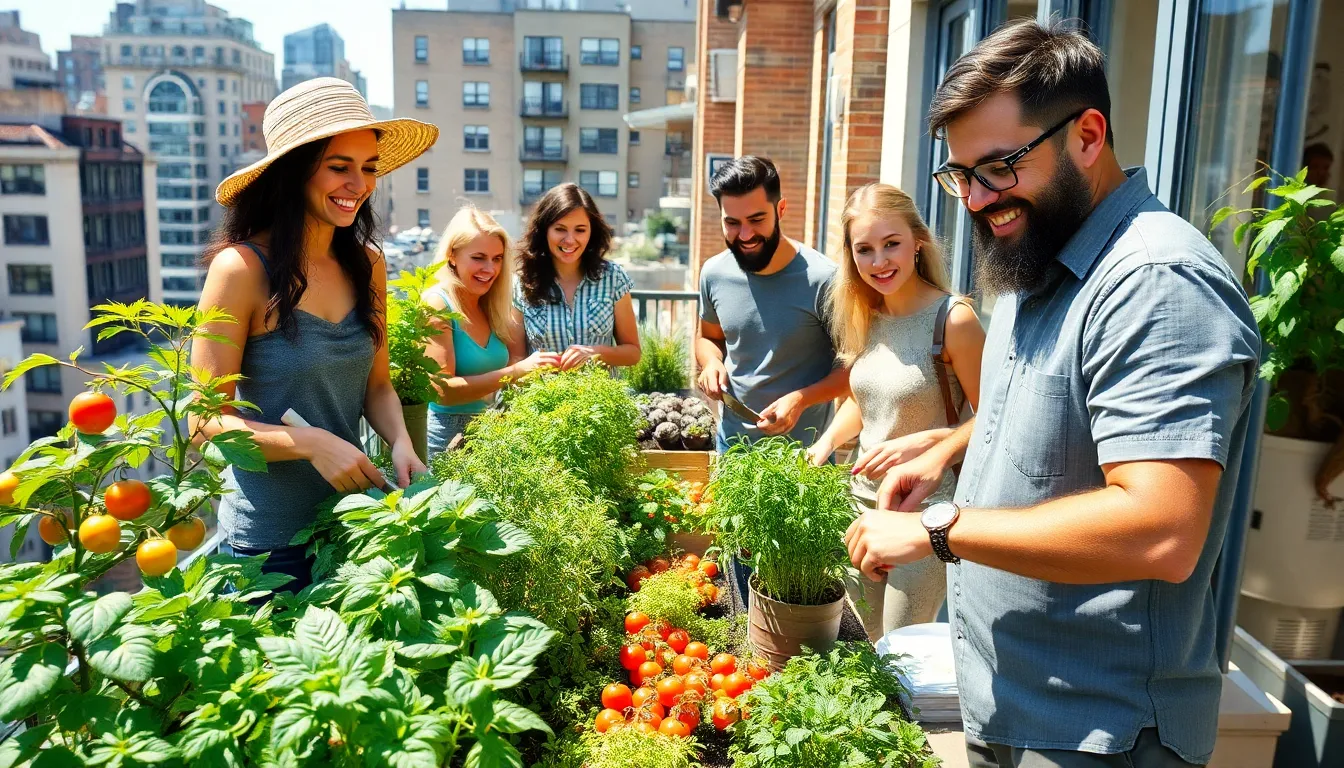In a world where concrete jungles reign supreme, urban gardening is the refreshing breath of fresh air everyone needs. Picture this: you’re surrounded by towering buildings, yet you can pluck a ripe tomato right from your balcony. Sounds like a dream? It’s not! Urban gardening transforms dull spaces into vibrant green sanctuaries, proving that even the smallest patches of earth can yield big benefits.
Not only does it spice up the view, but urban gardening also offers a treasure trove of perks. From reducing stress to promoting sustainability, growing your own herbs and veggies can turn anyone into a green-thumbed superhero. So why wait? Dive into the world of urban gardening and discover how a little dirt can lead to a whole lot of joy.
Urban Gardening Benefits
Urban gardening provides a practical solution for individuals living in densely populated environments. This practice allows for the cultivation of various plants, including edible options like tomatoes and herbs. Growing in small spaces, such as balconies or rooftops, transforms otherwise unused areas into lush, green spots.
Many people engage in urban gardening to enhance their physical and mental well-being. Studies show that interacting with plants can significantly reduce stress levels. Furthermore, urban gardens contribute to improving air quality in cities by absorbing pollutants.
Diversity in urban gardening settings thrives, offering various styles for different preferences. Container gardening, community gardens, and vertical gardens represent popular methods. Each method caters to individuals with limited space while promoting community engagement.
The sustainability aspect of urban gardening plays a crucial role in today’s environmental efforts. By choosing to grow locally, individuals reduce their carbon footprint associated with transporting food. Additionally, urban gardens support biodiversity by providing habitats for pollinators and other beneficial organisms.
Economic benefits arise from urban gardening as well. Reduced grocery bills result from cultivating one’s own produce. Furthermore, selling excess homegrown items at local markets can generate additional income.
Urban gardening fosters a sense of community. Neighbors often collaborate to share resources, tools, and gardening tips. This shared responsibility enhances social connections and encourages a collective commitment to green spaces.
Embracing urban gardening not only beautifies neighborhoods but also promotes healthier lifestyles and contributes positively to the environment. The potential for growth in urban settings continues to resonate with many individuals seeking both personal and communal improvements.
Health Benefits of Urban Gardening

Urban gardening fosters various health benefits, significantly contributing to overall well-being. By engaging in this practice, individuals can enhance their physical and mental health.
Physical Health Improvements
Engaging in urban gardening promotes physical activity, which enhances cardiovascular health. Gardening activities like planting, weeding, and harvesting burn calories, helping individuals maintain a healthy weight. Soil exposure increases beneficial bacteria and may boost the immune system. Incorporating fresh produce into diets improves nutrition and reduces the risk of chronic diseases. Urban gardens also enhance air quality, as plants filter pollutants and release oxygen. Furthermore, access to homegrown vegetables can lead to healthier eating habits, providing essential vitamins and minerals.
Mental Health Enhancements
Interacting with plants improves mental health by significantly lowering stress levels. Gardening activities provide relaxation, fostering mindfulness and emotional balance. Exposure to greenery may reduce symptoms of anxiety and depression, promoting a sense of calm. Community gardens enhance social connections, reducing feelings of loneliness and isolation. Moreover, nurturing plants fosters a sense of accomplishment, elevating mood and self-esteem. Regular contact with nature encourages creative expression and provides a positive outlet for emotions. Urban gardening, therefore, serves as an effective strategy for enhancing mental well-being.
Environmental Benefits of Urban Gardening
Urban gardening significantly impacts the environment in various positive ways. This practice not only beautifies spaces but also helps address ecological issues, making its benefits crucial for city living.
Promoting Biodiversity
Gardening in urban areas fosters biodiversity through the introduction of native plants. These plants attract pollinators such as bees and butterflies, which are essential for ecological balance. Studies demonstrate that community gardens create habitats, supporting a diverse array of species. Residents often engage in planting a variety of herbs and flowers, which enhances local ecosystems. Increased biodiversity maintains soil health and aids in pest control, ultimately contributing to a more resilient environment.
Reducing Urban Heat Island Effect
Urban gardening plays a pivotal role in mitigating the urban heat island effect. Plants naturally cool the air through transpiration, thus lowering surrounding temperatures. The presence of greenery reduces the reliance on air conditioning, leading to lower energy consumption. Research shows that areas with more vegetation experience temperature drops of up to 5°F compared to concrete-dense zones. By creating green roofs and vertical gardens, urban areas can effectively combat heat retention and improve overall air quality, fostering a more sustainable urban environment.
Economic Benefits of Urban Gardening
Urban gardening offers significant economic advantages within city environments. Reduced grocery bills remain a critical benefit for many urban gardeners. Growing vegetables and herbs at home decreases dependence on store-bought produce, which can be costly. Homegrown tomatoes, for instance, can save families up to $150 annually, depending on consumption. Local growing eliminates transportation costs and supports financial stability for households.
Increasing property values also stems from urban gardening initiatives. Homes featuring gardens often attract higher buyer interest and sell for more. Properties with maintained gardens can see value increases of 10 to 20 percent, according to real estate studies. Buyers often associate green spaces with improved aesthetics and healthier living environments, making gardens desirable. Beautified neighborhoods contribute to community pride, further enhancing overall property values. Thus, urban gardening not only benefits individual gardeners but bolsters entire communities economically.
Social Benefits of Urban Gardening
Urban gardening fosters strong community ties and provides meaningful educational opportunities that enhance urban living.
Community Building
Neighbors often connect through shared gardening spaces. Community gardens create platforms for collaboration, where individuals exchange knowledge and resources. Participating in gardening activities promotes interaction and encourages friendships among residents. Additionally, these shared spaces allow residents to create a collective identity centered around sustainability and healthy living. As a result, community gardening initiatives strengthen social networks and foster a sense of belonging. Studies suggest that urban gardens can reduce social isolation, enhancing neighborhood cohesion and overall community well-being.
Educational Opportunities
Urban gardening serves as a dynamic learning platform. Workshops and classes in community gardens offer practical gardening skills to participants of all ages. Children, in particular, benefit from hands-on experiences that promote curiosity and environmental awareness. Learning about plant life cycles and organic gardening strategies fosters a stronger appreciation for nature. Schools can partner with local gardens to incorporate gardening into science curricula, enriching students’ educational experiences. Ultimately, these educational opportunities empower individuals with knowledge about sustainable practices, leading to informed decisions about food consumption and environmental stewardship.
Conclusion
Urban gardening offers a wealth of benefits that extend beyond simply growing food. It serves as a powerful tool for enhancing personal well-being while promoting sustainability and community engagement. By transforming small spaces into green havens, individuals can experience improved mental and physical health.
The environmental advantages are significant as well. Urban gardening contributes to biodiversity and helps combat urban heat. Additionally, it fosters connections among neighbors, creating a sense of belonging and collaboration.
With the potential for economic savings and educational opportunities, urban gardening is a versatile solution for urban dwellers. Embracing this practice not only enriches lives but also paves the way for healthier and more sustainable urban environments.

